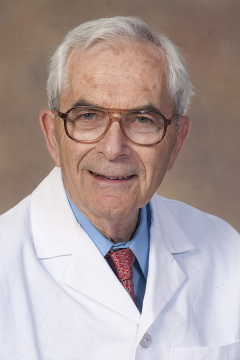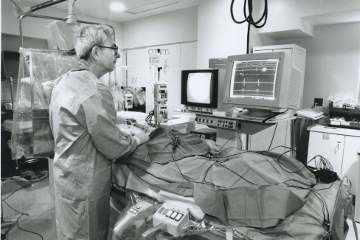With great sadness, we announce that Frank Marcus, MD, professor emeritus who dedicated more than 50 years to the Division of Cardiology at the University of Arizona College of Medicine – Tucson and the Sarver Heart Center, passed away at the age of 94.
 Dr. Marcus was born on March 23, 1928, in Haverstraw, New York, to Samuel and Edith Marcus. His hardworking immigrant parents spent much of their time and resources ensuring that he would achieve educational and professional success. Dr. Marcus took advantage of this opportunity and graduated from high school in 1944 at the age of 16.
Dr. Marcus was born on March 23, 1928, in Haverstraw, New York, to Samuel and Edith Marcus. His hardworking immigrant parents spent much of their time and resources ensuring that he would achieve educational and professional success. Dr. Marcus took advantage of this opportunity and graduated from high school in 1944 at the age of 16.
In 1948, he received his undergraduate degree from Columbia University and applied to medical school — but was rejected. This was the future doctor’s first major obstacle. It was his determination and self-confidence that spurred Dr. Marcus, upon this initial rejection, to work in medical research.
That year, he began a master’s program in physiology at Tufts University in Medford, Massachusetts, and he performed corticosteroid research at the Worcester Foundation for Experimental Sciences in Shrewsbury, Massachusetts. In 1949, Dr. Marcus was accepted into the Boston University School of Medicine. After graduating cum laude in 1953, he did his internship and residency at the Peter Bent Brigham Hospital in Boston in 1953-54 and 1956-57, then was a research fellow in cardiology there under the instruction of Drs. Samuel Levine and Bernard Lown. In 1958, he moved to Georgetown University Hospital in Washington, D.C., where he continued his cardiology training under the guidance of Dr. W. Proctor Harvey. After a year as chief medical resident at Georgetown University Hospital, he was appointed chief of cardiology at the Georgetown University Medical Service, D.C. General Hospital. He held this position from 1960 to 1968. During this time, he was promoted to associate professor of medicine at Georgetown University.
While at D.C. General, Dr. Marcus pursued various interests in cardiac research. Most notably, he and his colleagues published results on the metabolism of digitalis — a medication prescribed for some heart conditions — and other cardiac glycosides in normal subjects, patients with renal insufficiency, obese individuals, the elderly and patients who had undergone jejunoileo bypass, a surgical weight loss procedure performed during the 1950s through the 1970s that involved detaching and setting aside a portion of the small bowel.
 In January 1969, Dr. Marcus joined the UArizona College of Medicine, which had opened in September 1967, as professor and chief of the Section of Cardiology, now the Division of Cardiology, in the Department of Medicine. In 1971, he was offered the position of chief of cardiology at the University of Arizona Teaching Hospital, now Banner – University Medical Center Tucson. From 1982 to 1999, Dr. Marcus was a UArizona Distinguished Professor of Medicine at the College of Medicine and was director of the hospital’s Arrhythmia Service until he retired as professor emeritus of medicine in 2000.
In January 1969, Dr. Marcus joined the UArizona College of Medicine, which had opened in September 1967, as professor and chief of the Section of Cardiology, now the Division of Cardiology, in the Department of Medicine. In 1971, he was offered the position of chief of cardiology at the University of Arizona Teaching Hospital, now Banner – University Medical Center Tucson. From 1982 to 1999, Dr. Marcus was a UArizona Distinguished Professor of Medicine at the College of Medicine and was director of the hospital’s Arrhythmia Service until he retired as professor emeritus of medicine in 2000.
Dr. Marcus was founder and first president of the Arizona Chapter of the American College of Cardiology in 1987-88 and was president of the Association of University Cardiologists in 1990-91. Among his honors are the Outstanding Achievement Award of the European Cardiac Arrhythmia Society in 2011 and Pioneer in Cardiac Pacing and Electrophysiology Award of the Heart Rhythm Society in 2011.
During a 1979 sabbatical at Hospital Jean Rostand in Ivry, France, he was exposed for the first time to arrhythmogenic right ventricular cardiomyopathy, or ARVC, a genetic form of heart disease that causes the myocardium — the heart’s muscular wall — to break down, increasing the risk of arrhythmia, or abnormal heartbeats, and possibly sudden cardiac death. He spent his time researching ARVC and learning under professors Yves Grosgogeat and Guy Fontaine how to perform direct current ablation of the heart to remove abnormal cells.
When he returned to Tucson, Dr. Marcus worked to improve the techniques he had learned in France by searching for a safer energy source for the ablation procedure, which carried a high risk of myocardial damage. After much research, he found that radiofrequency energy was a successful substitute for direct current energy. He published an abstract on this research in the journal Circulation in 1985, followed by a well-received publication in the Journal of the American College of Cardiology in 1987.
Over the years, Dr. Marcus has published more than 300 manuscripts, contributed more than 60 book chapters, served on the editorial boards of 19 journals and held an active position on more than 30 medical committees.
 Among his many honors and awards, Dr. Marcus has received the Golden Apple Award for excellence in teaching at Georgetown University College of Medicine, the Award of Excellence from the cardiology section of the UArizona College of Medicine, the Laureate Award from the American College of Physicians, the Outstanding Reviewer Award of the American College of Cardiology, the Distinguished Alumnus Award from the Boston University School of Medicine, the Masters Clinician Award from the American Heart Council on Clinical Cardiology and, most recently, the Pioneer in Cardiac Pacing and Electrophysiology Award from the Heart Rhythm Society and the Outstanding Achievement Award from the European Cardiac Arrhythmia Society.
Among his many honors and awards, Dr. Marcus has received the Golden Apple Award for excellence in teaching at Georgetown University College of Medicine, the Award of Excellence from the cardiology section of the UArizona College of Medicine, the Laureate Award from the American College of Physicians, the Outstanding Reviewer Award of the American College of Cardiology, the Distinguished Alumnus Award from the Boston University School of Medicine, the Masters Clinician Award from the American Heart Council on Clinical Cardiology and, most recently, the Pioneer in Cardiac Pacing and Electrophysiology Award from the Heart Rhythm Society and the Outstanding Achievement Award from the European Cardiac Arrhythmia Society.
Colleagues, students and staff recognize Dr. Marcus as a kind physician who was calm even under pressure. Nancy Ronan, a nurse who has worked alongside Dr. Marcus for many years, says that the only way she could tell that he was stressed was a slight cough that would surface every so often.
Dr. Marcus’s dedication to mentoring young physicians is evident by the amount of time he spent at the bedside teaching his fellows, covering all aspects of clinical practice, from detailed physical examinations to complex arrhythmias. His commitment to medical education also is evidenced by the Samuel and Edith Marcus Visiting Professor in Cardiology, which he and his siblings established in his parents’ names in 1997 to support yearly visiting professorships at the UArizona College of Medicine – Tucson.
More About Dr. Marcus:
- Recognizing Dr. Frank Marcus's 50+ Years of Dedication as He Retires a Second Time (Lo Que Pasa, 2015)
- 40th Heart Rhythm Scientific Sessions Recognize Contributions of Dr. Frank Marcus to Understanding ARVC/D (Department of Medicine, 2019)
- 20th Anniversary Gala Event: Tribute to Dr. Frank Marcus (Mel and Enid Zuckerman College of Public Health, 2020)

